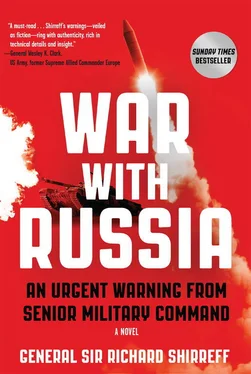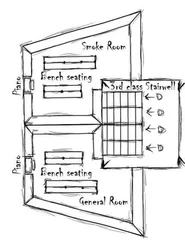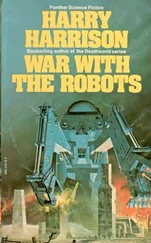“Russia has already attacked Latvia by indirect means. Now we must expect something more direct. I think it will come in a very short time. This is the time we need that unconditional support from our NATO friends and allies. If anything warrants a declaration of Article Five, it is this. Where is it?”
McKinlay felt that he was personally letting his friend down. Balderis had looked after him so well when he had spent a couple of weeks in Latvia last year, running the war game. Then, as scripted, NATO had of course declared Article 5. Now it was for real and NATO had not.
“Raimonds, I am not going to raise false hopes. Today’s NAC was a disaster. The Germans insist on an attempted political solution before there can be any declaration of Article Five, or any question of military deployment. I’m about to talk to SACEUR in the States and then I’ll be on the line to the UK, France and Denmark to see if they can’t get things moving unilaterally, on a national basis.”
Balderis allowed himself a touch of irony. “Our grandparents would never have believed that the mighty Fatherland—Germany—would one day be the most pacifist nation in Europe.” He gave a bitter laugh. “To paraphrase Bismarck, they clearly think the Baltic states are not worth the bones of a single Pomeranian Grenadier. Thanks, David. I know you’ll do what you can.” And with that the line went dead.
“SACEUR’s coming on to your Tandberg secure video link now, Sir.” Sergeant Lorna Bevin placed on his desk a mug, resplendent with the Globe and Laurel badge of the Royal Marines, and brimming with steaming, strong tea. “And seeing as you missed lunch, here’s a couple of biscuits.”
“Thanks, Lorna, you’re a star.”
“Hi, Dave.” SACEUR came through on the Tandberg from Washington. “I’ve heard about the NAC. What a mess. I’m about to head over to the White House. The National Security Advisor has called me over to talk to the President. What can I tell her?”
McKinlay was blunt. NATO was about to fail to protect one of its members and a number of European members appeared more worried about political process than recognizing that, for the first time since 1945, they were on the edge of a major war in Europe; two NATO members, Greece and Hungary, seemed almost pro-Russia and even if they hadn’t yet invaded, which looked imminent, the Russians were effectively attacking Latvia right now. McKinlay then concluded with a bald statement: if the Alliance were not to fail catastrophically, and thus be rendered redundant in one stroke, Article 5 had to be declared.
“OK, Dave. That’s clear. Let me reassure you, wearing my US hat as Commander European Command, and emphatically not as SACEUR, I’m going to ask for an immediate deployment by land, sea and air to reinforce Latvia. That though is strictly between you and me, until I have confirmation. If I do not get it, I never said this to you. I never asked the President. Do we understand each other?”
“Fully,” said McKinlay, keenly aware of the degree of trust his boss had just placed in him.
“Good. What you’ve just told me should help me persuade the President to give the final executive order. Meanwhile, on the NATO side, we’ve somehow got to get the Very High Readiness Joint Task Force moving. Frankly, I’ll do it without NAC approval if I have to, so can you work the nations and let me know when I get back where we stand with force generation? I’m flying back tonight, just as soon as I’ve seen the President. See you tomorrow sometime.”
Howard disconnected, was momentarily frozen on screen, and then the Tandberg closed down.
McKinlay sat back in his chair and sipped his tea. It seemed a long time since he’d been out with his black-and-white working springer in the forest behind his residence, La Belle Alliance, early that morning. It had been a long day, but there was a lot to do yet before he could even think of heading home. He hoped his wife had walked Megan that afternoon, otherwise he’d have a very disgruntled dog when he finally got home.
Two phone calls later, to the French and Danish Chiefs of Defense, and he had mixed success. The French were prepared to support the Latvians unilaterally, but only if a French general took command of the Allied effort if, and when, it became a NATO operation. McKinlay, as the man responsible for allocating the flags to post, assured him that he was happy with this, but only if the French provided the majority of troops in the force. That sensible stipulation did not sit well with the French, who made it clear that they did not yet have an agreement.
After him, the Danish Chief of Defense was typically direct and to the point. Denmark had a bilateral agreement with the Latvians and was in the process of sending a battalion of mechanized infantry and a tank company to Latvia. It would be there within five days.
“If only everyone was like the Danes,” commented McKinlay to his PSO, Swinton. “We’d better try the Brits now, Jamie. What do your spies tell you?”
“Not good news, I fear. The MOD is pretty forward leaning and, naturally, the Army, Navy and Air Force elements of the VJTF are gagging to go. But there’s a real blockage in Number Ten.”
“Well,” mused McKinlay, “better get me Vice Chief on the secure Brent phone. He at least understands NATO, unlike the Chief of Defense Staff. I’ll see what he says.”
He knew Air Chief Marshal Sir Tony Wilson, the Vice Chief of Defense, well. They’d worked together when he’d been a young, newly promoted lieutenant colonel. Wilson, a serious-minded, upwardly mobile RAF navigator with some NATO experience in Germany, had been a fellow planner in the Ministry of Defense. Sharp, inclined to being abrasive, he nevertheless had a good feel for the Alliance dimension. He was also straight-talking and would tell McKinlay how it looked from the UK perspective.
The Brent phone call was put through, McKinlay heard the familiar bleeps telling him his conversation was secure, then Wilson came on the line.
McKinlay got straight to the point. He outlined the situation in Latvia as NATO saw it and debriefed Wilson on today’s NAC.
“So there’s no immediate prospect of a declaration of Article Five for the moment, Tony. If the Americans decide to do something unilaterally to reinforce Latvia, is there any chance of UK joining them with units you’ve already got declared to the VJTF?”
Wilson confirmed what Swinton’s spies had told him.
“We’re up for it in the MOD. The problem is the PM.”
“The usual issue?” questioned McKinlay.
“Afraid so,” replied Wilson. “He’s surrounded by acolytes to whom the use of force, especially any mention of ‘boots on the ground,’ is anathema at the best of times. But faced with an Article Five crisis, Number Ten has gone into meltdown. The prospect of telling the British people that our soldiers may have to fight and die to defend the Latvians is too much for him. Word has it that it was discussed in Cabinet this morning and his considered contribution was that Britain spends far too much money on Latvia—stag-party beer money—and the Brits who spend it are unlikely to be the sort who would vote for him anyway. His bag carriers thought that was hilarious. On top of that, as we saw with the decision to launch air strikes over Syria, the PM refuses to do anything involving guns and body-bags without a clear House of Commons majority.”
“But he’s got a majority,” McKinlay said.
“Sure, but it’s pretty narrow, notwithstanding that Labour have gone into meltdown since Corbyn was elected leader. The problem is that many of the Tory backbenchers, especially the younger generation, aren’t prepared to back Article Five. All that stuff about Chamberlain in 1938, and why should our boys fight and, if necessary, die for a faraway country about which they know little and care even less.”
Читать дальше












